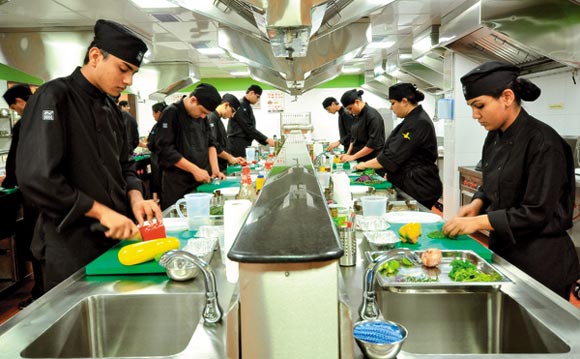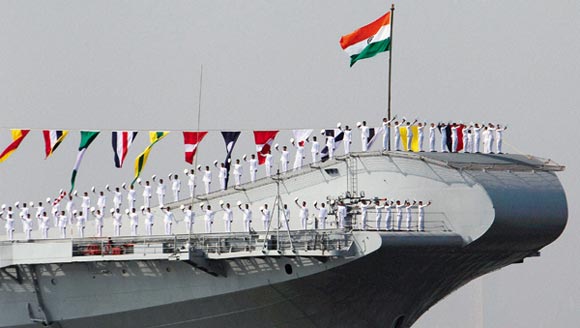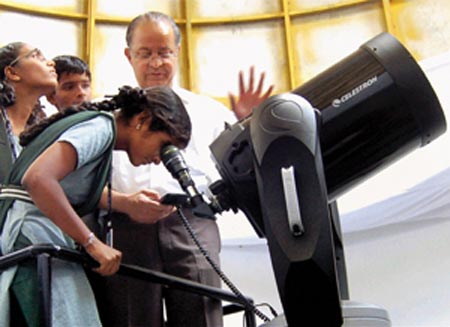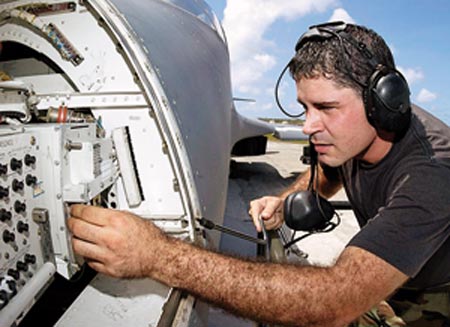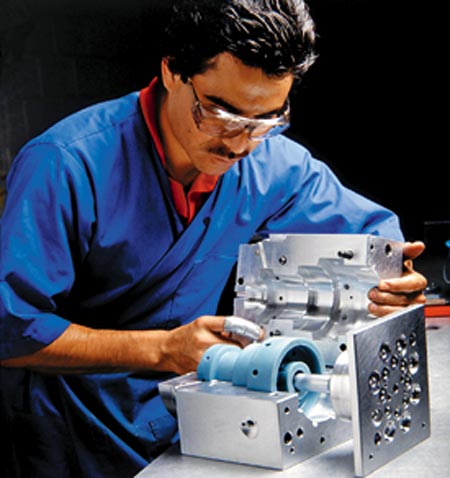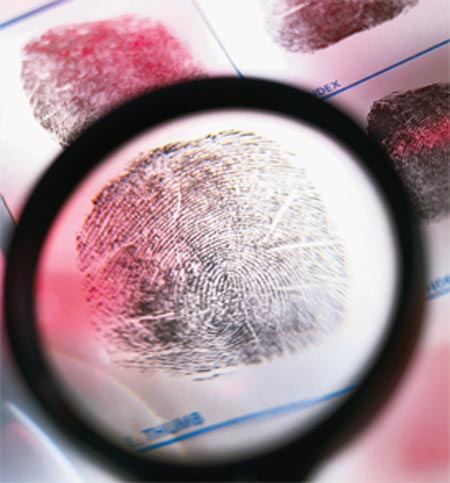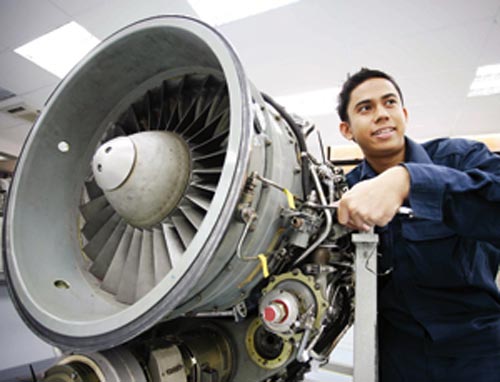 | « Back to article | Print this article |
8 job-friendly courses to pursue after Class 12
From culinary art to criminology and avionics, take a look at some exceptionally specialised programmes you can pursue after Class 12. Read on
Colleges across the country are attempting to introduce programmes off the beaten track to help keep pace with industry needs.
Degree programmes like the BA in Culinary Art, Criminology & Police Administration, Diploma in Plastic Mould Technology and BSc in Nautical Science, can be pursued after Class 12.
Many of these programmes are residential in nature, and have rigourous curricula since they tend to be industry-focused.
Most students zeroed in on their interest - Prakarshi's passion for cuisine prompted him to acquire BA in Culinary Art. Gangeshwar, a BA Criminology & Police Administration student links his course to a crime thriller movie that included regular visits to police station, court, crime bureau and forensic labs.
And for Sudhanshu, it was CNBC TV channel's financial analysts, which charged him to opt for BA in Finance & Investment Analysis course. We bring you the details of some select programmes across domains.
Illustration: Uttam Ghosh
Dear Readers, do you know of an unusual career that is promising and lucrative? How to pursue an unusual career? Recommend an unusual career to students. Share your ideas with us on Rediff ZaraBol below!
Please click NEXT to continue reading
1. BA in Culinary Art
Culinary art, as the name suggests, has more to do with the latter objective.
"It is all about food -- how to prepare it, how to cook it, and how to make it look like a work of art," says K Thirugnanasambantham, Faculty (Food Production), Welcomgroup Graduate School of Hotel Administration (WGSHA), Manipal University.
"I have been a big foodie since the time I would join my mother in the kitchen or conduct my own cooking experiments. My passion for food made me join the course," says Prakarshi Pulkit, a first year student of BA in Culinary Art at WGSHA.
Hotels, fast food chains like McDonalds, KFC, and Subway, the airlines industry, hospitals, retail and catering companies are all looking for graduates in culinary art.
The course teaches cooking and baking techniques, garnishing, knife skills, food carving, plate presentation, food photography, and hotel and restaurant management.
The hands-on training develops critical thinking skills necessary to run a food service operation. You also learn multi-tasking: supervising a team, keeping a check on nutritional levels, menu development, and marketing of food.
A culinary art graduate can be employed as a kitchen manager, sous-chef, banquet chef, restaurant chef, personal chef, food service director, food stylist, research and development chef, etc.
In the hotel industry, a fresher who joins as a management trainee can earn around Rs 20,000.
Culinary art subjects: Culinary skill, baking and patisserie, international food safety and nutrition, food cost and inventory management, global cuisine and gastronomy, food styling and presentation.
Institution offering the programme: WGSHA, Manipal University
Dear Readers, do you know of an unusual career that is promising and lucrative? How to pursue an unusual career? Recommend an unusual career to students. Share your ideas with us on Rediff ZaraBol below!
2. BA in Finance & Investment Analysis
Sudhanshu spotted a career path on the idiot box!
"I used to fancy being a financial analyst while watching business reports on CNBC TV channel," says this third year student of BA Finance & Investment Analysis.
Sudhanshu developed his passion for finance, quite precociously, in his school days.
Then, he zeroed in on BA in Finance & Investment Analysis, a course that starts you early on a career in banks, investment banks, stock markets, stock brokerages, foreign exchange dealerships, mutual fund organisations, insurance companies, and financial consultancies.
"As we step into our class, we are expected to have gone through at least one business daily and be picked randomly by the teacher to talk about the latest buzz in the finance world," said Tyagi.
Financial analysts make an assessment of the viability, stability and profitability of a business and prepare reports using ratios that make use of information taken from financial statements.
They should also have the ability to communicate somewhat complex financial concepts and strategies to their clients using terms which are easy to understand.
Finance and Investment subjects: Business communication and negotiation, fundamentals of business management, financial accounting, business statistics, legal aspects of business, cost amd management accounting, managerial economics, financial management, economic environment and policy, financial statement analysis, quantitative techniques, corporate restructuring and merchant banking, international finance.
Institutions offering the programme: Shaheed Sukhdev College of Business Studies (SSCBS), Amity College of Commerce and Finance
Dear Readers, do you know of an unusual career that is promising and lucrative? How to pursue an unusual career? Recommend an unusual career. Share your ideas on Rediff ZaraBol below!
3. BSc Nautical Science
The need for mastering the sea and ship transport is important from the standpoint of India's growing international trade.
A BSc Nautical Science degree does just that. It equips you with the basic knowledge required to safely navigate the sea and operate a ship.
You learn to plot positions and courses as well as damage control procedures. You also learn cargo handling.
The course is designed for those who have studied physics, chemistry and maths at plus two level. And it helps if you have the favourable temperament towards seafaring.
On completion of the pre-sea training, students join shipping companies and become nautical deck cadet. After a year of such experience, a deck cadet can appear for the competency test and get certified, which enables them to sail on any ship anywhere in the world!
More experience and passing of exams are needed to be promoted to Chief Officer and Captain of the ship. "A captain is the god at sea.
He commands the route of the voyage and handles the vessel in adverse conditions," says Captain Vivekananda, the Vice Chancellor of Vels University, Chennai.
"Students wake up at 5.30 and are called out to march in their uniforms, which is followed by classroom teaching," says Vivekananda. The starting salary of a navigating officer ranges from Rs. 15,000 to 25,000 per month. A Captain's salary could be USD 8000 a month.
Nautical Science subjects: Applied mathematics, electricity and electronics, navigation, cargo handling, seamanship, ship operations, international code of signals.
Institutes offering the course: Vels University, Indian Maritime University, Mumbai, Hindustan Institute of Maritime Training), Indian Maritime University (Chennai)
Dear Readers, do you know of an unusual career that is promising and lucrative? How to pursue an unusual career? Recommend an unusual career to students. Share your ideas with us on Rediff ZaraBol below!
4. BTech in Physical Science
Why are the colours of rainbow in the order that they are? And what moves the earth and other planets?
These are the kind of questions that Physical Science answers. It is the study of the inorganic world.
One can think of this discipline as comprising four broad areas: Astronomy, Physics, Chemistry, and the Earth Sciences. Each of them is divided into fields and sub-fields.
"Our B.Tech programme in Physical Science is designed to meet the needs of space research organizations," says Narayana Murthy, Professor and Head of Department (Physical Science) at Indian Institute of Space Science & Technology (IIST), Thiruvananthapuram.
The students learn a lot about the universe beyond the Earth, including the Earth's gross physical properties, such as its mass and rotation, insofar as they interact with other bodies in the solar system. There are also subjects like Optical Astronomy, which is observation of the heavenly bodies through the optical window -- i.e. like reflecting and refracting telescopes.
Organisations like ISRO, DRDO, Indian Institute of Meteorology look for Physical Science graduates. A person holding a B.Tech Physical Science degree can work -- among various jobs -- as Atmospheric Scientist who studies the atmospheric characteristics and as a Physical Meteorologist who analyses the chemical and physical properties of atmosphere, the transmission of light, sound, radio waves, and the transfer of energy in the atmosphere.
Physical Science subjects: Astronomy, astrophysics, atmospheric and ocean sciences, remote sensing, GIS and chemical systems.
Institution offering the course: IIST, Thiruvananthapuram.
Dear Readers, do you know of an unusual career that is promising and lucrative? How to pursue an unusual career? Recommend an unusual career to students. Share your ideas with us on Rediff ZaraBol below!
5. BTech in Avionics
BTech degree in Avionics can widen your knowledge of electronics and give you a sophisticated understanding of electronic systems as they are used on aircraft, artificial satellites and spacecraft.
You will learn about avionics including communications, navigation.
"Students who graduate with CGPA (cumulative grade point average) of 6.5 are directly placed at Indian Space Research Organisation (ISRO) projects. They get hands-on experience in designing communication systems for various space missions," says Dr Thomas Kurian, Professor and Head of Department (Avionics) at Indian Institute of Space Science & Technology (IIST), Thiruvananthapuram.
"A good grasp of the concepts of avionics can give them the ability to make quick repairs in aircraft," he adds.
IIST-Thiruvananthapuram conducts ISAT, a national level test, to select about 150 students for this four-year programme.
Today, they are largely employed in organisations like ISRO, Defence Research and Development Organisation (DRDO), Hindustan Aeronautics Ltd (HAL).
Avionics subjects: Digital system design, digital communication, VLSI design, navigation, guidance and control, computer technology and power electronics, electronics, microelectronics, control systems, etc
Institute offering the course: Indian Institute of Space Science & Technology, Thiruvananthapuram
Dear Readers, do you know of an unusual career that is promising and lucrative? How to pursue an unusual career? Recommend an unusual career to students. Share your ideas with us on Rediff ZaraBol below!
6. Diploma in Plastic Mould Technology
Without the sophisticated plastic components, think of products like chairs and tables, storage containers, mechanical parts, wire spools, packaging, bottle caps, automotive dashboards, pocket combs, etc.
These components are made of thermoplastic and thermosetting plastic material. They are then fed into a heated barrel, mixed, and forced into a mould cavity where it cools and hardens to the configuration of the cavity.
The technology is broadly termed 'plastic mould technology'. As the demand for 'high-tech' plastic components continues to grow, institutes like Central Institute of plastics Engineering & Technology (CIPET) have started to offer a diploma in plastic mould technology.
"A student is made familiar with the workings of the plastic industry and learns the technique on CAD/ CAE/ CAM systems," says Dr Santhana Krishnan, Deputy Director, CIPET.
A plastic moulder's job is highly valued in a tool room.
In the classroom, students are engaged in activities like mould plate making and designing moulds by the use of AutoCAD.
"We have placed our students in automobile parts manufacturing companies such as Hyundai, Visteon, Supreme and Bright Autoplast," says Santhana.
A plastic mould technician can also find jobs in petroleum products and petrochemicals companies and several other manufacturing companies. Starting salary ranges from Rs 10,000 to Rs 15,000.
Plastic mould technology subjects: Design/ tooling/ CADCAM/ CNC programming, product Development/ processing of plastics.
Institutes offering the course: CIPET (Amristar, Bhopal, Bhubaneswar, Lucknow, Hyderabad, Guindy).
Dear Readers, do you know of an unusual career that is promising and lucrative? How to pursue an unusual career? Recommend an unusual career to students. Share your ideas with us on Rediff ZaraBol below!
7. BA in Criminology
Undergraduation in Criminology and Police Administration will familiarise you with the real-life cases of law enforcement agencies dealing with the detection, investigation and prosecution of crime.
"With increasing crime rate in the country, a career in criminology and police administration is gaining in value," says Assistant Professor, D Dhayanand, Department of Criminology and Police Administration, Agarsen College, Chennai. Criminology graduates can start their careers at private security companies, central and State police organisations like CBI and CID, Railway Protection Force, Central Industrial Security Force, BSF, Indo-Tibetan Border Police Force, etc.
A criminologist finds out the reasons behind a reported crime and works on different modes of investigation, punishment, rehabilitation and correction.
"In the third year, we prepare and present field reports on police station, magistrate's court, fire station, district crime records bureau, forensic science labs, forensic medicine department, central jail, etc.," says Gangeshwar Giri, a third year student of Agarsen College.
The course includes compulsory classes on physical training, squad drill (saluting with arms/cane), horse riding, swimming, yoga, and karate etc.
Criminology subjects: Principles of Criminology, Vigilance & Security Management, Prison Administration, Cyber Crimes, Crowd Control and Riot Management, Private Detective and Investigation, among others.
Institutions offering the course: Agarsen College-Chennai, Karnataka University, University of Pune, Aligarh Muslim University, Madras University
Dear Readers, do you know of an unusual career that is promising and lucrative? How to pursue an unusual career? Recommend an unusual career to students. Share your ideas with us on Rediff ZaraBol below!
8. BTech in Aerospace Engineering
Beyond the romance of flying lie hard-core scientific concepts like the forces of 'lift' and 'drag' that act on an aircraft.
If the early scientists had not dealt with those concepts, we would not have been flying today.
You can follow in the footsteps of aviation pioneers like the famous Wright brothers by going for a B.Tech in Aerospace Engineering.
It is a branch of engineering concerned with the design, construction and science of aircraft and spacecraft. It is further divided into 'aeronautical engineering,' which deals with craft that stay within Earth's atmosphere, and 'astronautical engineering,' which is concerned with craft that operate outside the atmosphere.
"To excel, a student must have a good grip over Maths and Physics," says Professor R Santhana Krishnan, Department of Aerospace, Hindustan Institute of Engineering Technology, Chennai.
As a student of BTech in Aerospace Engineering, you will learn subjects like fluid mechanics, astrodynamics, statics and dynamics, control engineering and materials science.
"I teach how lift is produced in the aircraft and make students familiar with hydraulic systems used in engines," says Krishnan.
Aerospace Engineering graduates can start their career in public-sector defence and space organizations, such as HAL, NAL, DRDO.
Technology companies in the private sector, such as GE, Satyam, Infosys, also offer great careers. A graduate can expect to start with a salary of Rs 18,000 to Rs 25,000 a month.
Aerospace engineering subjects: Flight mechanics, aerodynamics, thermal and propulsion, structure and design
Institutes offering the course: IITs, Punjab Engineering College, IIAE-Dehradun, Hindustan Institute of Aeronautical Engineering-Bangalore and Nehru College of Aeronautics, Coimbatore.
Dear Readers, do you know of an unusual career that is promising and lucrative? How to pursue an unusual career? Recommend an unusual career to students. Share your ideas with us on Rediff ZaraBol below!

